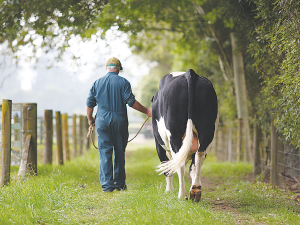LIC lifts half-year revenue on strong demand for dairy genetics
Herd improvement company LIC has posted a 5.2% lift in half-year revenue, thanks to increasing demand for genetics.
 LIC says long-term users of its genetics have almost doubled the speed of improvement in their herds over the last decade.
LIC says long-term users of its genetics have almost doubled the speed of improvement in their herds over the last decade.
Farmer-owned LIC says the goal of being both sustainable and profitable is well within reach for New Zealand dairy farmers
Releasing its second annual Sustainability Report, the co-operative noted that farmers with a sharpened focus on herd improvement were already making great strides.
LIC chair Murray King says while the co-op’s focus on sustainability is not new, sustainability reporting is an evolving area for LIC, as it is for many other businesses.
“This is our second year reporting on our sustainability journey and it’s fantastic to see the progress we have made towards our goal of becoming carbon neutral by 2050,” says King.
One of the highlights of the report is that farmers are breeding better cows faster.
It points out that longterm users of LIC genetics have almost doubled the speed of improvement in their herds over the last decade, allowing them to breed better cows – which produce more and are more emissions- efficient – at a much faster rate.
“We’re helping farmers breed better cows and get the best from them,” it says.
“As part of our commitment to faster genetic gain, this year our team of scientists investigated the full spectrum of MINDA herds in search of the ‘best cows’ and whether a clear correlation existed between breeding worth (BW) and milk production efficiency.
“The research reaffirms that the best cows (with high BW) are more efficient at turning feed into milk – they produce more and are more emissions efficient.”
LIC says to help the dairy sector meet its environmental goals, NZ farmers must breed more of those highly efficient cows that sit at the top, and fewer of those who sit at the bottom.
It notes that at an individual farm level there can be many variable factors, but it is conceivable that by 2030 a farmer’s whole herd could be performing at the level of their top 25% cows today.
“Breeding the best cows, faster, is key to helping farmers solve the challenge of being profitable and sustainable.”
After assessing genetic data, LIC estimates that over the past 32 years (from 1990 to 2022) the genetic improvement its Premier Sires artificial breeding bull teams delivered on-farm has resulted in a 12% reduction in enteric methane and 14.5% less urinary nitrogen emitted per kgMS.
The report states that during the 2021-22 season, LIC has delivered more methane efficient genetics to farmers than any other year.
“The increased rate of genetic improvement in production and fertility traits without any increase in animal size, and the shorter generation interval that genomic selection enables has created a consistent trend of NZ farmers breeding more emissions efficient cows, and year-on-year they’re doing it faster.”
The report also notes that LIC recorded an overall reduction in its total carbon dioxide emissions of 16.3% when comparing 2021/22 with its base year (2018/19), excluding biogenic methane.
LIC’s 2021-22 biogenic methane has decreased by 11.93% from base year.
Global trade has been thrown into another bout of uncertainty following the overnight ruling by US Supreme Court, striking down President Donald Trump's decision to impose additional tariffs on trading partners.
Controls on the movement of fruit and vegetables in the Auckland suburb of Mt Roskill have been lifted.
Fonterra farmer shareholders and unit holders are in line for another payment in April.
Farmers are being encouraged to take a closer look at the refrigerants running inside their on-farm systems, as international and domestic pressure continues to build on high global warming potential (GWP) 400-series refrigerants.
As expected, Fonterra has lifted its 2025-26 forecast farmgate milk price mid-point to $9.50/kgMS.
Bovonic says a return on investment study has found its automated mastitis detection technology, QuadSense, is delivering financial, labour, and animal-health benefits on New Zealand dairy farms worth an estimated $29,547 per season.

OPINION: Here w go: the election date is set for November 7 and the politicians are out of the gate…
OPINION: ECan data was released a few days ago showing Canterbury farmers have made “giant strides on environmental performance”.